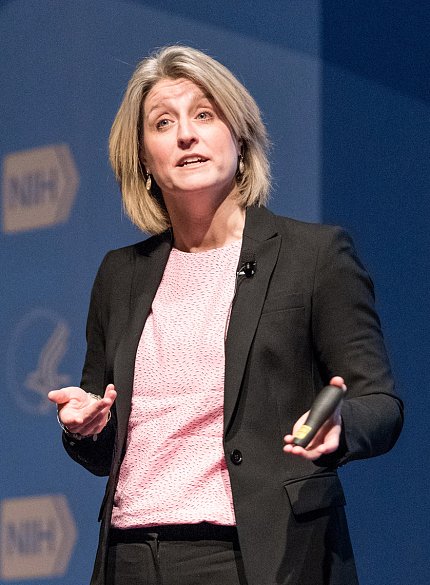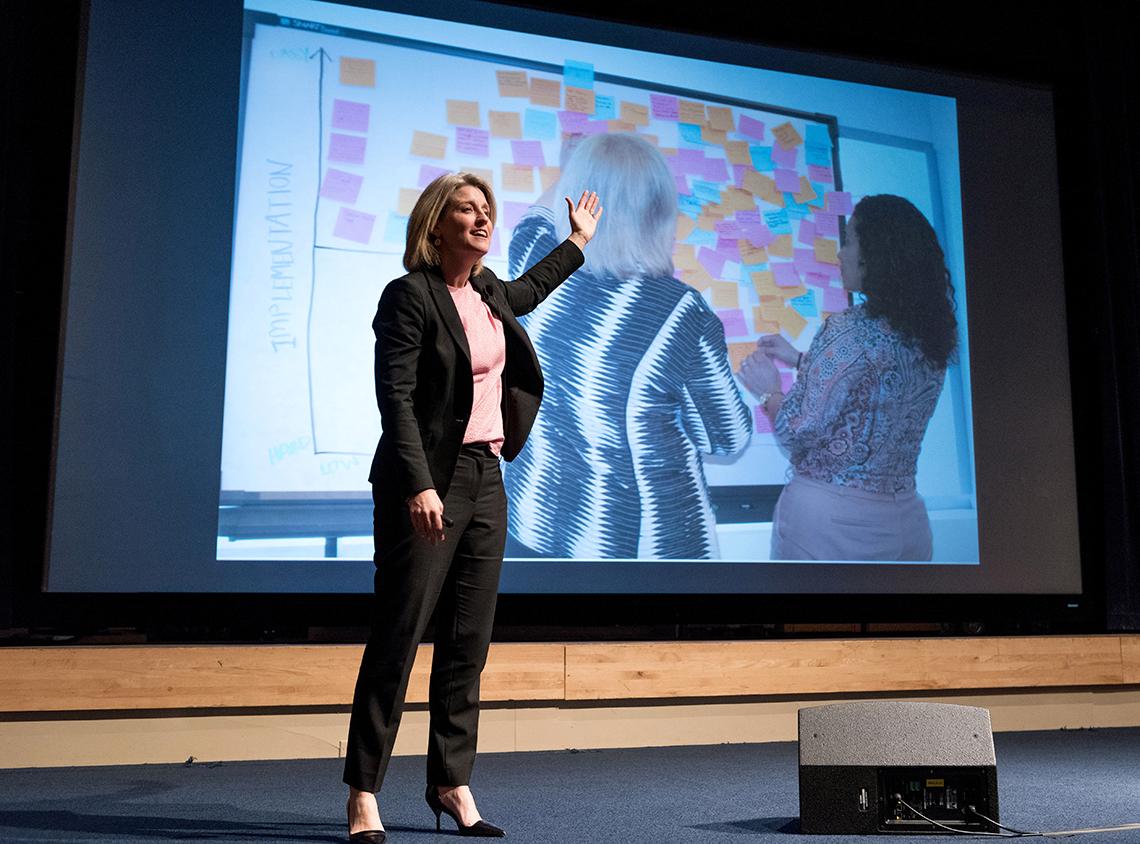Keep It Simple
To Be Productive, Dispense With Complexity, Says Bodell

Photo: Andrew Propp
Life keeps getting busier and more complicated. Are we making things more difficult than they need to be?
“The problem is that complexity is the enemy of meaningful work,” said Lisa Bodell, CEO of Futurethink and author of Why Simple Wins. “It holds you back from driving growth, from reaching mission, from creating value.”
Organizations of all sizes can simplify their practices, said Bodell, speaking at a recent Deputy Director for Management seminar in Masur Auditorium. And even small changes can yield big results.
Scripps Health in California, for example, wanted to reduce emergency room wait times, which averaged 8 hours. By simplifying the check-in process, they sped up admissions and increased revenues and patient satisfaction.
Not long ago another large organization, United Parcel Service, rolled out a new policy: no left turns. Bodell said this simple change is saving UPS drivers time and gas on each route while dramatically reducing carbon emissions. And customers are receiving their packages faster.
Simplicity saves time and money and it spares frustration, said Bodell, who related a personal story of trying to buy patio furniture with accumulated credit card points. After an initial runaround, the company mailed her 200 gift cards. Then the web site only let her enter 10 at a time. Many hours and headaches into her supposedly easy online purchase, she was fed up with the company.
“Dealing with companies that are complicated makes you not want to work with them,” Bodell said. Successful companies make it simple to get a ride (Uber), share files (Dropbox) or rent a movie (Netflix).
“The startups and groups winning today are operating with speed, because speed is more important than size,” Bodell said. “If you’re operating with complexity, you can’t get there; you can’t innovate.”
Today’s world is increasingly fast-paced and full of distractions, so it’s easy to lose focus. “We’re conditioned for complexity. We like to multitask…and we create the same level of urgency for everything,” said Bodell. “We focus on the daily crap versus the mission-critical.”
So much complexity is self-imposed and within our sphere of control, Bodell said. How can we embrace change and simplify so we can get to the meaningful work? It involves shaking things up a bit.
“Change doesn’t happen when we’re comfortable. It happens when we have productive agitation,” said Bodell. “When we’re uncomfortable, we question the way things work; we question our assumptions. Right now, we don’t question enough and we operate with too much complexity.”
It might seem discouraging to try to simplify a large organization, especially a federal one, yet many large organizations are finding ways to ditch complexity in formal and informal ways. Merck, for example, has simplification teams. HBO and Google have bureaucracy-busting sessions.
Simplification can start within a branch or team, or with one person’s idea and a willing supervisor. Bodell offered suggestions to help put simplification into practice.
First, identify areas to simplify. Make a detailed list of 20 typical tasks, circle the few you consider most valuable and consider what can be eliminated. Then list desired work that you could finally get around to by eliminating extraneous tasks.

Photo: Andrew Propp
Another suggestion, which requires an open-minded supervisor, is to kill a stupid rule. Choose something that can be changed, said Bodell, something within your sphere of control that can make an impact.
She said an employee at one company asked the CEO to nix the monthly operating report. Much to the employee’s chagrin, the CEO disclosed that he created the report, but he also hated it. It was eliminated and nobody missed it.
Employees from every type of workplace identify the same disruptions to their productivity: meetings and emails. “You came [to this job] with a mission and a purpose,” said Bodell. “If you can’t get to it because of meetings and emails, that’s not good.”
Another step toward simplification is changing habits. Create a code of conduct unique to your work. Consider eliminating redundancies and prioritizing assignments. Is it possible to shorten meetings, emails and documents? Perhaps resolve to use clearer, jargon-free language.
If you eliminated 1 report or meeting, or whittled down a meeting by 20 minutes, how much more would you get done? Be your own chief simplification officer, said Bodell. Do one thing at a time, see progress and that will inspire you to tackle the next thing. Keep eliminating rules and simplifying.
By killing complexity, the organization builds customer trust, retains staff and shows it can respect individuals’ time.
“If you get the work right, you get the culture right, because you can get to the work that matters,” she concluded.
